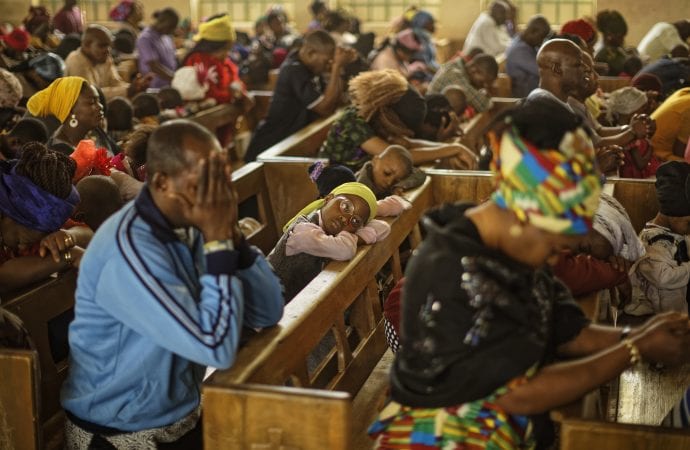Back in the late 1970s, James Wuye was a young Nigerian and fervent Christian believer, who converted to Catholicism and later joined the Assemblies of God Pentecostal church amid his country’s first wave of sectarian violence. He watched as bands of Muslim extremists struck Christian targets, burning schools and churches, and felt helpless as local police and security forces did nothing.
Eventually Wuye, who grew up a “child of the barracks” as the son of an army officer, decided he was tired of waiting. He helped organize other Christian youth into secret paramilitary units, stockpiling weapons and training for combat. Wuye paid a price in the flesh, losing his right hand during a pitched battle in 1992 to defend a church in Kaduna, a heavily Muslim area. Today he wears a prosthetic limb as a result of the injury.
Later Wuye had a second conversion experience and embraced non-violence, going on to found a conflict resolution center with his friend Imam Muhammad Ashafa - like Wuye, a veteran of militia combat. They spring into action whenever tensions flare up, trying to prevent larger-scale conflicts.
While Wuye’s story is inspiring, it’s also exceptional.
Nigeria is not the Middle East - Christians aren’t a tiny minority, they’re at least half of Africa’s most populous nation of 200 million, and their patience can’t be expected to be infinite. If Christians in Nigeria were ever to decide to take the fight to the enemy, the resulting violence could make the Christian/Muslim carnage in the nearby Central Africa Republic, which left thousands dead and produced almost a million refugees and displaced persons, seem a mere spat.
In 2015, my Crux colleague Inés San Martín and I were in Nigeria, where we met a young Christian attorney named Dalyop Salomon in the country’s Plateau state, where attacks on Christian targets by militant Muslim members of the Fulani tribe are commonplace. Salomon’s project was to whip up support for a UN resolution authorizing Christians in the area to arm themselves, hoping that would lead to countries agreeing to supply arms for the fight.
A victim of the violence named Dalyop Davou Jugu had much the same sense.
“I don’t know why our religious leaders here are teaching us that we should not fight,” he said. “[They say] we should not do anything and that this is the practice of our religion, [but I believe] that we should defend ourselves.”
That background comes to mind in light of news on Friday that another Catholic priest has been killed in Enugu State in Nigeria’s southeast, with local church sources reporting they believe the attack was carried out by Fulani. Father Paul Offu became the third Catholic priest murdered in the area over the past five months.
Overall, the Jubilee Campaign, which advocates for religious freedom worldwide, recently submitted a report to the International Criminal Court claiming that Fulani assaults on Christian farming communities in Nigeria meet the international standard for a “genocide.” Their data claim that 52 such attacks took place between the beginning of 2019 and mid-June. The Nigerian-based civil society group International Society for Civil Liberties and Rule of Law asserts that some 2,400 Christians were killed by the Fulani in 2018 alone.
The Fulani-driven violence is often described as not “religious” or “sectarian”, because it also involves a decades-old land use conflict between herders and farmers. However, Sister Monica Chikwe of the Hospitaler Sisters of Mercy recently told me during a Rome conference on anti-Christian persecution that it’s tough to tell Nigerian Christians this isn’t a religious conflict since what they see are Fulani fighters clad entirely in black, chanting “Allu Akhbar!” and screaming “Death to Christians!”
So far, Nigeria largely has been spared a larger eruption in part because of the leadership of Christian clergy, who generally preach non-violent resistance. It’s unclear, however, how much longer that philosophy can hold up if the violence continues unabated and the perception is that government authorities are unable, or unwilling, to do anything about it.
Nigeria is an emerging African superpower, it’s the largest oil producer in Africa with proven reserves of 37 million barrels (10th-largest in the world), and it’s also the country with the world’s largest mixed Muslim/Christian population. If things go bad, the consequences won’t be confined to Nigeria’s borders, but could spark economic, military and cultural upheaval around the world.
Sooner or later, the international community will be forced to recognize that the fate of Nigeria’s Christian population isn’t just a human rights issue - though it’s certainly that - but also a major global security concern.
In thinking about the future of Nigeria’s Christian population, especially those on the front lines of the Fulani militancy, the right question may well be the one famously posed by Langston Hughes about Harlem back in 1951:
“What happens to a dream deferred? Does it dry up like a raisin in the sun? … Or does it explode?”

